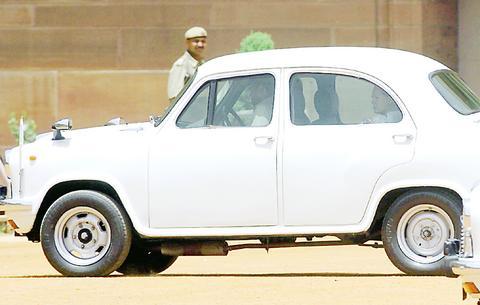Sonia Gandhi announced yesterday that she would not become India's first foreign-born prime minister, stunning her supporters and the nation.
"The post of prime minister has not been my aim," she told members of her Congress party in the central hall of Parliament.
"I was always certain that if ever I found myself in the position I am in today, I would follow my inner voice. I humbly decline the post," she said.

PHOTO: AFP
Gandhi shunned the top job even though her Congress party and its allies trounced the Hindu-nationalist party of caretaker Prime Minister Atal Bihari Vajpa-yee and his Democratic National Alliance in national elections that ended last week.
She said she was acting in the interest of the nation.
Her party reacted with uproar. Congress lawmakers shouted and pleaded with Gandhi to change her mind. She had to stop speaking several times to get the audience to quiet down.
"I request you to accept my decision," she said, adding that she would not reconsider.
Her decision came after Hindu nationalist outrage grew against her Italian origins and her background as a Roman Catholic, as well as investor fears that she would not be able to withstand demands from leftist allies to peel back market-driven reforms that have made India's economy boom.
Earlier yesterday, Gandhi met with President A.P.J. Abdul Kalam but did not, as widely expected, leave with his approval to form a minority government that would be dependent on the outside support of two communist parties.
"It is my inner voice, my conscience," she said of her decision to withdraw.
"My responsibility at this critical time is to provide India with a secular government that is strong and stable," Gandhi said.
Congress sources said Gandhi had put forward Manmohan Singh and Pranab Kumar Mukerjee, two former finance ministers, as possible candidates for the prime minister's post.
Somnath Chatterjee, a legislator from the Communist Party of India-Marxist, suggested that Gandhi's decision was based on fears for her family, which is India's top political dynasty.
"There are rumors that her children are against her becoming prime minister, maybe because of security reasons," he said.
Some Hindu nationalists took to the streets yesterday saying a foreigner should not lead India, even though Gandhi has been an Indian citizen for more than two decades.
"A foreigner becoming the prime minister of the country will put national security and the country's self-respect in jeopardy," Uma Bharti, a former sports minister in outgoing Vajpayee's government, was quoted as saying by the Press Trust of India news agency.
Also See Story:
Investors cautiously return to battered Indian stock market

Indonesia yesterday began enforcing its newly ratified penal code, replacing a Dutch-era criminal law that had governed the country for more than 80 years and marking a major shift in its legal landscape. Since proclaiming independence in 1945, the Southeast Asian country had continued to operate under a colonial framework widely criticized as outdated and misaligned with Indonesia’s social values. Efforts to revise the code stalled for decades as lawmakers debated how to balance human rights, religious norms and local traditions in the world’s most populous Muslim-majority nation. The 345-page Indonesian Penal Code, known as the KUHP, was passed in 2022. It

‘DISRESPECTFUL’: Katie Miller, the wife of Trump’s most influential adviser, drew ire by posting an image of Greenland in the colors of the US flag, captioning it ‘SOON’ US President Donald Trump on Sunday doubled down on his claim that Greenland should become part of the US, despite calls by the Danish prime minister to stop “threatening” the territory. Washington’s military intervention in Venezuela has reignited fears for Greenland, which Trump has repeatedly said he wants to annex, given its strategic location in the arctic. While aboard Air Force One en route to Washington, Trump reiterated the goal. “We need Greenland from the standpoint of national security, and Denmark is not going to be able to do it,” he said in response to a reporter’s question. “We’ll worry about Greenland in

PERILOUS JOURNEY: Over just a matter of days last month, about 1,600 Afghans who were at risk of perishing due to the cold weather were rescued in the mountains Habibullah set off from his home in western Afghanistan determined to find work in Iran, only for the 15-year-old to freeze to death while walking across the mountainous frontier. “He was forced to go, to bring food for the family,” his mother, Mah Jan, said at her mud home in Ghunjan village. “We have no food to eat, we have no clothes to wear. The house in which I live has no electricity, no water. I have no proper window, nothing to burn for heating,” she added, clutching a photograph of her son. Habibullah was one of at least 18 migrants who died

Russia early yesterday bombarded Ukraine, killing two people in the Kyiv region, authorities said on the eve of a diplomatic summit in France. A nationwide siren was issued just after midnight, while Ukraine’s military said air defenses were operating in several places. In the capital, a private medical facility caught fire as a result of the Russian strikes, killing one person and wounding three others, the State Emergency Service of Kyiv said. It released images of rescuers removing people on stretchers from a gutted building. Another pre-dawn attack on the neighboring city of Fastiv killed one man in his 70s, Kyiv Governor Mykola